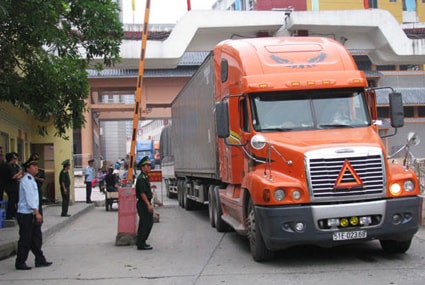Every day, 1,000 tons of Chinese fruit enter Vietnam.
On average, every day at Tan Thanh border gate, Lang Son, about 1,000 tons of fruit are imported into Vietnam.Male
The Plant Protection Department (Ministry of Agriculture and Rural Development) has just announced the test results that discovered 2 grape samples, 1 pomegranate sample, 1 fresh plum sample imported from China with preservative residues exceeding the permitted threshold by 3-5 times. However, in recent days, reporters of the Lao Dong Newspaper were present at the Tan Thanh - Lang Son border gate, the largest fruit import hub in the country - and recorded that this place is still bustling with convoys of trucks importing fruit from China.
Official import
Every day from afternoon to 9 pm, convoys of fruit trucks line up to cross the border to complete import procedures. The entire Tan Thanh border gate area is packed with large trucks, mainly agricultural products. Mr. Nguyen Van Chuong, Head of Tan Thanh Customs Branch (Lang Son Customs Department), said that according to current regulations, fruit is an item with an import tax rate of 0, so almost 100% of fruit imported from China to Vietnam is officially imported and not smuggled as before. Currently, fruit imported from China is mainly apples, pears, oranges, tangerines, cantaloupes... On average, about 40 containers or large trucks are imported every day, equivalent to 1,000 tons of various types of fruit.

Fruit trucks from China flock to Vietnam through Tan Thanh border gate
According to regulations, all agricultural products, including fruits, must be quarantined by Tan Thanh Plant Quarantine Station, after which the customs department will allow import procedures. However, according to Mr. Nguyen Quang Bach, Deputy Head of Tan Thanh Customs Branch, fruits are imported in the form of border trade between traders of the two countries, not between businesses, so there is a lack of binding responsibility and the risk of unsafe product quality is very likely to occur because there is no sales contract but only a verbal agreement.
Do not eat off-season fruit.
Ms. Be Thi Thu Hien, Head of Tan Thanh Plant Quarantine Station - Plant Quarantine Sub-Department Region VII, said that all imported fruit products are sampled for quarantine at a rate of 10%. Recently, the rapid inspection station discovered a sample of fresh plum with preservative residue exceeding the allowable limit.
Currently, the Plant Protection Department has directed strict inspection of plum products and conducted 30% sampling according to regulations. In addition, stricter inspection will be focused on potatoes and some fruit products that have potential risks of food safety. According to Ms. Hien, due to the off-season, since the beginning of September, only 42 tons of fresh plums have been imported to Vietnam.
According to Ms. Nguyen Thi Ha, Head of the Plant Quarantine Sub-Department of Region VII, normally off-season fruits use pesticides for preservation, so the risk of pesticide residues and not ensuring food safety is always higher than that of main-season fruits. Currently, China is entering the main season of apples, pears, oranges, tangerines, and cantaloupes, so the use of preservatives will be much more limited than that of off-season fruits.
“Chinese plums are all off-season plums harvested in April and May in Shanxi province and kept in cold storage, and certainly contain excessive preservatives to maintain quality. When preservatives are used, off-season fruits will not be as delicious and fresh as in-season fruits. Therefore, consumers should not eat these types of plums because the risk of food safety is very high,” Ms. Ha warned.
Immediately after discovering that plum samples contained pesticide residue exceeding the permitted limit, the Plant Quarantine Sub-Department of Region VII officially notified the Quarantine and Inspection Department (Pingxiang - China) to coordinate better control of fruit products.
According to NLDO-M






